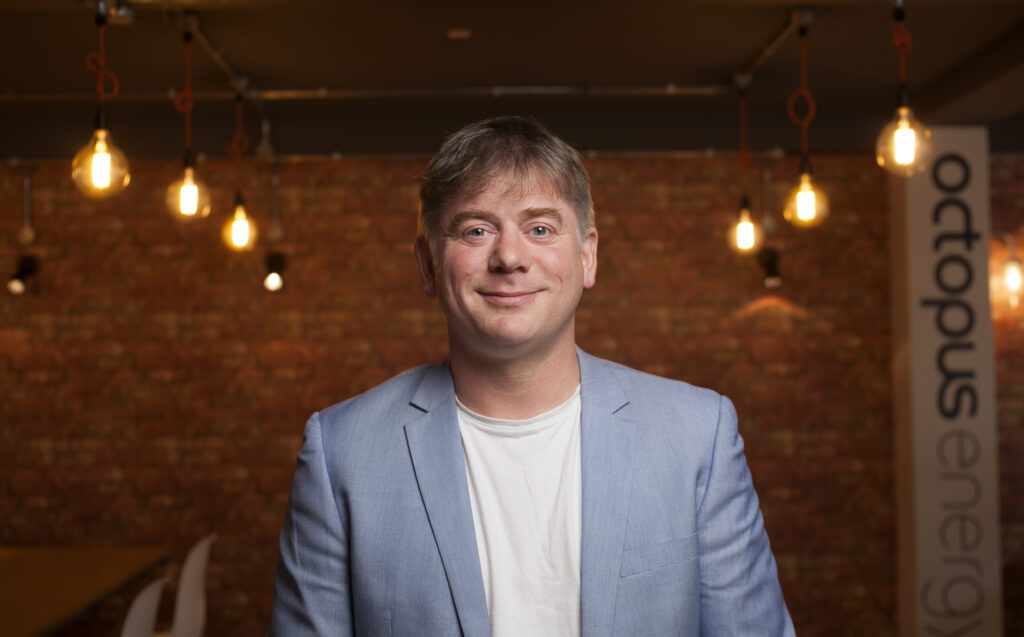The UK’s energy sector has seen a record number of new entrants, but also huge struggles for the start-ups trying to compete with the ‘Big Six’. One of the standouts is Octopus Energy, which recently purchased software company nCube.
The company’s founder and CEO Greg Jackson talked to Current± about the challenges of being a new contender in the energy sector, the future of infrastructure and technology evangelists.
Could you tell me a little about your recent acquisition of nCube?
Yes, our mission is to use technology to bring lower price, more transparent, greener energy to people with outrageously good service, so part of what makes us different is that we believe that technology is the absolute key to an affordable green energy revolution. We need to build deeper tech capability to drive that.
What Octopus has got is a whole load of services, which bring dynamically priced energy to consumers so that when the wind blows, the sun shines and the grid is empty, consumers can benefit from cheap electrons.
To make that more convenient, we need to automate a lot of the devices that use energy, so instead of a customer having to choose manually to do things, it’ll just happen automatically for them when green electrons are in plentiful supply and nCube’s technology really gives us a massive advantage.
What nCube has that’s powerful for us is integrations with 100 different devices and platforms. What we’re trying to do is not create a walled garden, there are some companies that say that in order to have access to our service, everything has to be from us, you should be able to buy all the things that are right for you.
Do you think that lack of interoperability is holding other companies back?
There’s always a chicken and egg situation isn’t there? People don’t buy stuff that’s interoperable. But no one makes it interoperable until consumers have bought it. And so it really takes leadership from companies to say, look, we’ll invest in this before people are ready to buy it, because that’s what will generate the demand.
Why was it important that nCube’s Phil Steele joined Octopus and what exactly is this future technologies advantage?
Phil was the brains behind it. He’s the guy that kind of came up with the idea of having this highly connected platform and I think for us, it gives us someone who can talk to every device manufacturer and every platform about how we collaborate to build this open ecosystem. What we need is people who, before technology is even commercially a scale opportunity, can say we should be building this, now.
That is the future technology of energy being evangelised. So literally, his job is to break that chicken and egg cycle and bring as many partners to the table as we possibly can to deliver the future of energy quickly.
What challenges do you think Octopus faces, particularly as a young energy company in the sector?
I think our biggest challenge is actually the risk of not growing fast enough. We have to relentlessly drive scale globally, with an ever bigger customer base. In three and a half years, we’ve grown to a business with a revenue on about £1.5 billion, 1.3 million households in three countries. The opportunity here is to build it into the hundred million customers, £100 billion of revenue in dozens of countries.
Do you think as a young company, these challenges are different from those facing traditional companies?
Totally. I think the race is between how quickly they can transform into agile 21st century businesses and how quickly we can get to scale. So we start off as an agile 21st century digital tech business. And we’ve now got to get bigger than and indeed a lot bigger. And they start off big, but they have to transform themselves.
Could you tell me a little about your recent partnership with Tesla?
It’s the first partnership they’ve done like this in the world, and it’s a great example of using this kind of technology to optimise solar panel generation, Tesla power batteries, an electric vehicle and the grid. Octopus and Tesla, joining our tech together is creating that kind of ecosystem we talked about earlier, it’s a good example of the kind of globalization of the future of energy, as it cuts across sectors that have never worked together before.
How does not investing before we know what the system looks like, interplay with having a technologies evangelist?
Technology companies taught us that we need to be very agile. When Apple launched the iPhone in 2007 there was no app store. Apps came several years later, what happened was Apple looked at how people were using the phone, realised all the capabilities that hadn’t yet been unlocked and then responded to quickly.
The way companies respond to what they’re seeing, is actually at the very heart of how you think about tech.
Legacy companies often try to create tech now for what they think the world will be like in 10 years’ time. Most of what they build will be redundant. Because they just didn’t guess how consumers would react, they didn’t guess what other companies would do and they didn’t anticipate the new ecosystem. I mean, no one knew when the iPhone was launched that it’d be less than five or ten years before it destroyed the licensed taxi industry in many cities. So I think what’s absolutely critical is being able to get out there and be building these very, very agile, open ecosystems, rather than trying to guess what the ten year picture looks like.






